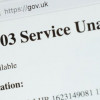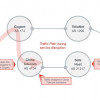Is your company a soft target or is your security industrial strength ?
For many companies the phrase "increased security" simply means asking the reception staff to ensure that all visitors are issued with a pass. However, as businesses around the world face the prospect of terrorist attacks, Richard Whitby, head of consultancy at Global Continuity plc, explains what else we can do to minimise the risk.
As I visit our clients since the World Trade Centre attacks the discussion often turns to the grim acceptance that there is little we can do to prevent a terrorist crashing a hijacked plane into a building. But are companies doing enough in the areas that are within their control?
VISITORS
Most companies issue security passes to all visitors. However, the danger here is in
being too assuming. A terrorist is unlikely to meet our expectations of how they
dress. Don't assume that a person in a suit carrying a briefcase is therefore
telling the truth and is not a threat:
* Ensure all visitors have an appointment or are known to your staff - ask them who they
are here to see. Your reception staff must not prompt them with "You must be
here to see Mr Smith" - they then only have to answer "yes".
* Accompany all visitors at all times around the building. This may mean keeping
them in reception until your staff member comes to collect them.
* Introduce a "challenge culture" whereby staff will stop and question strangers
without a badge.
EXTERNAL SECURITY
What about the minutes before the terrorist enters your building? The objective here
is to prevent a terrorist from getting anywhere near your building in the first place.
This may require introducing an extra cordon of security before the visitor reaches
your reception desk:
* Where possible, check all vehicles at the gates - before they enter the car park.
Ask to look in the trunk. Ask for briefcases and boxes to be opened. If
a terrorist sees such checks being carried out they may think again before attempting
entry.
* Prevent strangers from parking under the building - this is often the most effective
place to leave a bomb.
* If you own the roads leading up to your building, or have a driveway, introduce "no
parking" areas. Not only does this move the threat further away, but it also
reduces the opportunity for the terrorist to sit and observe your building for any length
of time.
DELIVERIES
This can be a difficult area to police. But some thought can help you reduce the
threat:
* Make sure the delivery is expected, or is from a recognised supplier.
* Insist drivers stay with their vehicles at all times. This reduces the likelihood
of a stranger wandering into your building.
* Ensure parcel deliveries are clearly marked by the sender. If a courier delivers a
package with unclear markings, or from an unknown source, ask them for details of the
sender. Quarantine the package in the meantime.
* Ensure that staff know what to do if suspect packages are received.
OUT OF HOURS
If your building is largely unoccupied at night then ask yourself "are our security
procedures relaxed?":
* Add extra security staff. One security guard cannot, simultaneously, let a visitor
in, call a member of staff, allow access to a lorry and watch several CCTV screens.
* Check on security, cleaning and maintenance staff. They will often have "access all
areas" swipe cards and keys. They will have access to lockers and cupboards
which, perhaps, nobody else visits.
* Are you confident that the company which employed these people has checked their job
references?
* Could they have an unexplained and uninvestigated gap in their employment history?
* Speak to the employing company. Ask to see the checks that they carry out.
MULTI-OCCUPANCY PREMISES
These buildings prevent problems of their own. Often the landlord will be
responsible for security for the building generally and such buildings may have two
receptions - one on the ground floor under control of the landlord and one on the floor
that you occupy. Don't assume that this makes you twice as safe - the ground floor
reception usually simply asks visitors to "sign in" and then directs them to the
appropriate floor.
* Press the landlord for the introduction of enhanced measures and if they are reluctant
to do so get permission to introduce them yourself.
KEEPING THE PRESSURE ON
Once you have introduced processes and procedures to increase security you absolutely MUST
keep the pressure up. Terrorists will expect a drop in alertness in the weeks or
months after an attack.
* Spot-check those processes often, intermittently and without warning.
* Get colleagues from other buildings to visit your building. Ask them whether your
processes were adhered to.
* Ask them to attempt to get past your reception staff.
* Get feedback on the results and tighten the gaps that are exposed.
Finally, many of the measures mentioned here will not take huge resources or expenditure
to implement. They are based on common sense and trying to put yourself in the
terrorists shoes. Remember, you have a duty to your staff and visitors to keep them safe.
And you have a duty to your stakeholders to keep the company in business.
SNP.









































































